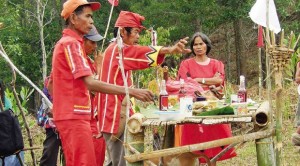‘Magbabaya’ a green god for tribe

MEMBERS of the Higaonon tribe lead a communal rite seeking permission from Magbabaya (Supreme Creator) for the utilization of land and other terrestrial resources that are considered priceless gifts. PHOTO FROM MinDaNow!
NAAWAN, Misamis Oriental—Colors burst along the banks of Lake Danao as villagers clad in crimson traditional garb gather for a communal rite that traces its roots to ancient traditions and is performed to seek permission from Magbabaya (Supreme Creator) for the utilization of land and other resources.
Echoes of chants and soft humming envelope the usually quiet community of Lubilan, a far-flung barrio in the hinterlands of Naawan, and home of the Higaonon, an indigenous tribe found in the northern region of Mindanao.
“The entire Higaonon ritual is a series of rites performed to ask permission from Magbabaya to clear the area, utilize the soil and grow trees,” said Salvador Almiñe, municipal planning and development coordinator of Naawan municipality.
Known as the “people of the living mountains,” the Higaonon people are also considered “safe keepers” of the land, which is considered a priceless gift from Magbabaya. The tribe’s name came from the words higa (living), goan (mountains) and onon (people).
Almiñe explained that the ritual was also part of the long-term commitment of the people of Naawan to take care of their environment through the implementation of the Naawan Green Governance Program (NGGP).
Article continues after this advertisement“The NGGP, which is mainly designed to protect the environment, also aims to implement the massive reforestation project along the periphery of Lake Danao, the town’s main water source,” he added.
Article continues after this advertisementAlmiñe said the municipal government of Naawan had initially collected more than P300,000 in funds for the reforestation project. The funds were generated by the town’s payment for environment services (PES) program under the NGGP.
“Through our PES program, the municipal government issued an ordinance to collect P1 for every cubic meter of water that a household consumes,” Naawan Mayor Jaime Roa said.
He explained that the reforestation project was a component of the long-term mechanism designed to protect the watershed, ensure sustainability of the water system and restore the town’s damaged environment.
“We aim to initially plant 1,200 trees as part of a goal to reforest 25 hectares within Naawan each year,” Roa added.
A premier source of lumber during the 1960s and 1970s, Naawan’s 4,000 ha of forest cover produced high-quality timber such as molave, narra, and lawaan for Mindanao’s top logging concessionaires.
Currently, the remaining forest cover around Lake Danao has declined to about 50 ha, only 5 percent of its original forest cover of 1,000 ha. The entire municipality of Naawan has a remaining forest cover of about 200 ha.
Local chief executives in Mindanao are urged to implement PES programs to ensure the sustainability of industries that are dependent on natural resources and help restore the island-region’s heavily degraded environment.
“We need to ensure that our local governance must be parallel with efforts to protect and conserve our environment,” said Luwalhati Antonino, Mindanao Development Authority (Minda) chair.
She added that through ordinances, any local government unit (LGU) may implement a PES program that allows it to collect fees for the use of natural resources.
A partnership agreement was sealed between the Naawan municipal government and Minda through the MindaNOW! Nurturing Our Waters Program in the implementation of the StraTREEgic Project as one of the components of the municipality’s NGGP.
The StraTREEgic Project aims to achieve effective watershed and coastal management among LGUs and is designed to increase environmental awareness and disaster mitigation and provide income opportunities for the community. It also advocates the use of PES as a mechanism for resource mobilization and social cohesion.
“Reforestation, including the planting of trees in the uplands and mangroves in our shorelines, is vital in lessening the damage caused by flash floods and storm surges,” said Antonino, adding “Mindanao has a remaining 10-percent forest cover, and we must exert all efforts to bring our environment back to what it was.”
The MindaNOW! program seeks to integrate and harmonize a ridge-to-reef approach in managing Mindanao’s resources through coordinated planning, policy advocacy and by providing platforms for public-private partnerships so that local initiatives can be supported.
Antonino said the role of LGUs in implementing PES programs was crucial since its success was largely dependent on the quality of leadership and governance at the local level.
“Naawan has shown that it can be done, so there’s no reason why other Mindanao municipalities can’t,” she added.
————————–
(Editor’s Note: Author Louie M. Rodaje is the communications head of the Mindanao Development Authority.)